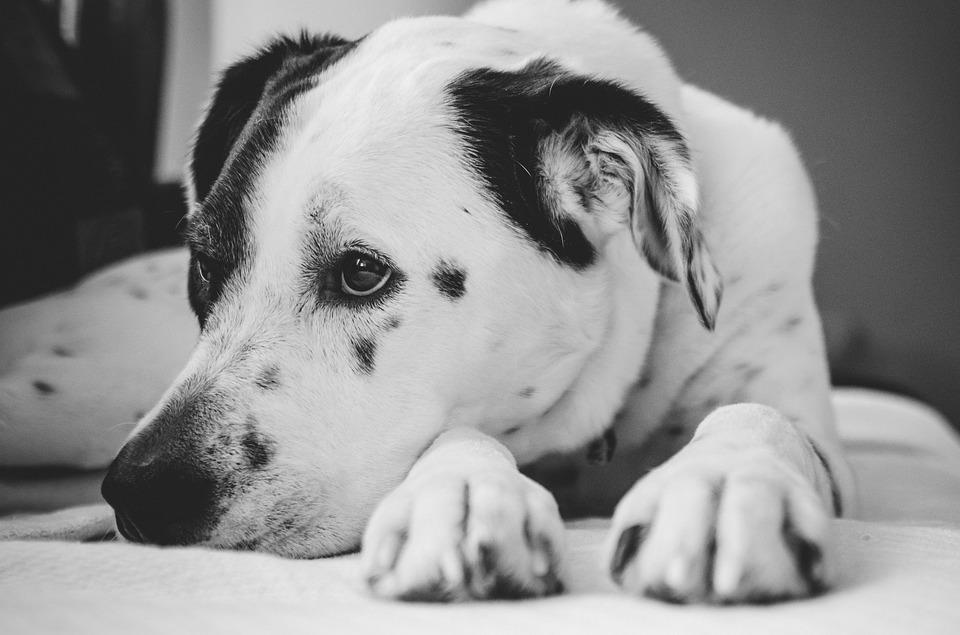Is My Dog Dying? - Symptoms of a Dying Dog



See files for Dogs
The death of a pet is the most unfortunate subject in terms of care. It is also one of the few experiences we can expect with all pets. While it will never be easy, it is something we need to prepare for. Some dogs can die unexpectedly, others may be more understandable given the context of the situation. Unexpected deaths could be due to an accident or sudden illness. With senior dogs or dogs with underlying health problems, we may have more time to prepare. Whether we want to help provide emergency medical treatment or we want to best prepare for the end, we need to know is my dog dying?
At AnimalWised, we look at the symptoms of a dying dog to know when they are in trouble. If your dog is otherwise healthy, it is important you seek medical attention immediately if your see these signs your dog is dying.
1. They don't want to go outside
Over time, older dogs decrease their level of physical activity. Sometimes, they may stop wanting to leave their home as often as before. However, if far your dog has always wanted to go for frequent walks and all of a sudden rejects this part of their routine, you should start to suspect that something is wrong.
If your dog does not want to go for a walk, this does not automatically mean that they are close to death. It could be due to many reasons, both physical and psychological. Pregnancy or even phantom pregnancy can reduce a dog's desire to exercise, although only usually near time of labor. There could be a non-fatal pathology which is making them weak and lessening their drive for exercise.

2. They show abnormal behavior
When your dog is sick or is even close to death, they will carry out abnormal behaviors that can help us identify a poor condition. We may begin to see behavioral problems related to their mood. They can include inappropriate fears or phobias, sudden aggressive behavior, abnormal movements or many others. You may also notice incontinence, vomiting, diarrhea or other disorders.
The type of abnormal behavior can help direct a veterinarian to the cause of the problem. For example, if your dog has gastric torsion, they may lie on their side, make strange noises or become very weak. Any behavior which occurs all of a sudden and may indicate illness should be treated with seriousness.
3. Their vital signs are altered
Among the different signs that a dog will die we will likely see an alteration of the vital signs. Dehydration, excessive wheezing or an abnormal body temperature may indicate that something is not going well.
We explain to you what are the vital signs of a healthy dog:
- Body temperature: the normal body temperature of an adult dog is between 37.8 ºC and 39.2 ºC (100.04 ºF and 102.56 ºF).
- Respiratory rate in dogs: the normal respiratory rate at rest should be between 10 and 30 breaths per minute (RPM).
- Heart rate in dogs: between 90 and 140 beats per minute in small dogs, between 70 and 110 beats per minute in medium dogs and 60 to 90 beats per minute in large dogs. These values are also applicable to a dog at rest.
- Capillary refill time: the CRT can be identified by lightly pressing the mucus membranes of the dog. You should analyze how long it takes to regain normal color. Pressure is usually applied to the mucus membranes of the mouth (gums) and the time must be less than two seconds.
In any case, an alteration of the vital signs of a dog indicates that it is necessary to go immediately to the vet.

4. They don't want to eat or drink water
Since a healthy appetite is common in a healthy dog, as loss of appetite often implies the opposite. If our best friend starts to refuse food, it is usually because something is wrong. This is especially the case if they refuse their preferred food such as wet food or treats. They may also stop drinking water and we will be forced to hydrate them.
As a consequence of the lack of food and water intake, we will begin to observe that the dog vomits bile and that their organs begin to fail. This will cause pain, rejection towards us and discomfort in the dog.
5. They hardly want to move
If you watch your dog lethargic in a corner of the house and they are showing all the symptoms we mentioned above, perhaps your dog is near death. When a dog is about to die, they will often seek somewhere comfortable and want to be alone. This is a delicate moment for them and they often reject their owners, although rarely in any aggressive way.
When this happens and there is nothing we can do to help them, the most important thing to do is to provide comfort. Although we can create a comfortable place to rest, the dog will choose somewhere secluded and away from everyone. We need to ensure we don't add any unnecessary stress with loud noises or other interruptions. We can be there with them and provide reassurance through gentle petting.

Do dogs know when they are dying?
It is very difficult for us to determine whether a dog knows they are going to die. We do not have the means of communication to either understand if a dog knows the end is near or even to what degree they understand the concept of death.
What we do know is that a dog which is dying will change their behaviors, as we have explained with the above signs a dog is dying. They obviously feel that something is affecting them and they feel weak or despondent. Whether they understand that this is the end of their life is both impossible to know and, in some ways, immaterial. What is important is that we best ensure they are not alone and that we can provide for them in their last moments.
Read the following sections to know in more detail what to do if your dog is dying.
What to do if a dog is dying
If you suspect that your dog is dying and they also show all or any of the signs we have mentioned throughout the article, do not hesitate and contact your vet quickly. While these symptoms may indicate they are close to death, they are also symptoms of different pathologies and diseases. Only the veterinarian can determine what the true cause and provide any possible treatment.
Consulting a specialist will also help you make the best decision. In some cases, euthanasia in dogs is required. This is most often the case when the dog is in considerable pain which cannot be relieved or when their quality of life is very low. While it may be the last option we want, our veterinarian will help us assess whether it is the best option for our dog.
If you feel that this is not an option in your case, you must offer them the best care possible to end their life with dignity and surrounded by those they love most. They may need help with feeding, drinking and sometimes even urinating or defecating.
While it will be very difficult for us as guardians, it is important we show support to the dog in their last moments. We may find it unbearably sad, but we should emote to the point we cause the dog fear or discomfort. We need to be strong for our companion's benefit.

What to do when a dog dies
The death of a dog is one of the saddest and most painful moments for any dog guardian. You must decide what to do with the animal's body.
If your dog has died during veterinary consultation, the specialist will probably suggest you incinerate the body of the dog, either in private or with other bodies of other deceased dogs. If the dog has died at home, you can call your veterinarian to follow this same process, but you can also contact an animal funeral home. The veterinary option may be more clinical, but it is often the cheapest option.
Do not forget that if your dog is on the pet register of your country you must tell them to remove the name. This is to ensure the census is up to date.
Grieving a dead dog
Grieving the death of a pet can be a long process. It requires time, acceptance and a state of mourning. Although many people cannot understand it, the truth is that dogs and humans create a very strong bond, sometimes even more than those with other humans. We should look at the animal's death in context, but we should not needlessly minimize it.
While another dog will not replace the same animal we have lost, adoption can help us to move on. We recommend going to an animal shelter to adopt dogs in need of a home. There are many abandoned animals in shelters or kennels who can benefit from your love and care.

This article is purely informative. AnimalWised does not have the authority to prescribe any veterinary treatment or create a diagnosis. We invite you to take your pet to the veterinarian if they are suffering from any condition or pain.
If you want to read similar articles to Is My Dog Dying? - Symptoms of a Dying Dog, we recommend you visit our Other health problems category.










